#Pierre Branda
Text
Gaudin’s description of Napoleon
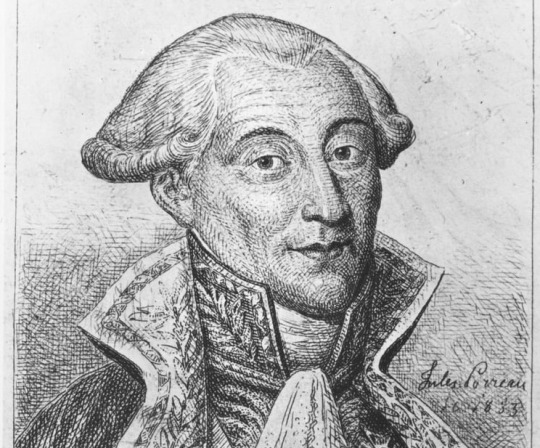
Martin-Michel Gaudin was Napoleon’s Minister of Finance. He entered the world of finance at the age of 17 and achieved the highest rank a non-aristocrat could achieve in finance administration pre-Revolution (“first clerk”). During the Revolution, he was the Commissioner of the National Treasury. He left government in 1795 and resisted further governmental recruiting attempts until Napoleon (who he had never met) approached him in 1799. Gaudin describes their first meeting in his memoir:
I found a personage who was known to me only by the high reputation he had already acquired; of low stature, dressed in a gray frock coat, extremely thin, yellow complexion, eagle-eyed, with lively movements [...] he came to me with the most gracious air.
“You have,” he said, “worked in finance for a long time?”
“Twenty years, General!”
“We need your help badly, and I’m counting on it. Come on, take your oath, we’re in a hurry.”
This formality completed, he added: “The last minister of the Directory will be informed of your appointment. Meet in two hours at the ministry to take possession of it, and provide a report on our situation as soon as you can, as well as on the first measures to be taken to restore the service which is lacking everywhere. Come see me this evening at my house on rue de la Victoire (that’s what rue Chantereine was then called), we will discuss our business more fully.”
I withdrew to carry out the orders I had just received.
(Source: Gaudin, Mémoires, souvenirs, opinions et écrits du duc de Gaète, pp. 45-46)
Historian Pierre Branda on their partnership:
“Intuition, good advice or genius? Bonaparte’s choice was judicious, because Gaudin would successfully occupy this ministerial post for the entire duration of the Consulate and the Empire, including the Hundred Days. With such longevity, he was undoubtedly one of Napoleon’s most appreciated ministers. It is true that the two men were often in perfect agreement.”
(Source: Le prix de la gloire: Napoléon et l’argent, pp. 197)
#Pierre Branda#Martin-Michel Gaudin#Gaudin#Napoleon#napoleon bonaparte#napoleonic era#napoleonic#first french empire#french empire#france#history#finance#economics#19th century#french history#minister of finance#1800s#Le prix de la gloire: Napoléon et l’argent#Le prix de la gloire#Napoléon et l’argent#description of Napoleon#description#Branda
62 notes
·
View notes
Text
Organization of Napoleon's households

With my bad knowledge of French, I'm reading this. For data hounds out there, you will love this book so much. It includes lists of personnel, amounts of stuff purchased, what food they ate, how many candles, all the sentries, security, etc. I'm skipping a lot of the statistics.
Poor Duroc had a job that was as enormous as Berthier's. There was also Daru, completely overwhelmed with organization. These people deserved any honors they got but even that wouldn't compensate for the stress!
Later--it gets even better with all of the etiquette, the chamberlains, pages, aide-de-camps, etc., who kept people away from Napoleon.
33 notes
·
View notes
Text
Maréchaux d'Empire: La gloire pour destin
Quelle horreur!
On the other hand, this book will keep me alternating between guffaws and serious eye-rolls for days.
The "replacement" for David Chandler's anthology, Napoleon's Marshals, published in 1987 with each of the 26 mini-bios written by for-real scholars [and not just Americans, either] is this November 2023 anthology edited by Francois Houdecek, who holds forth at the Sorbonne, claims to be a "disciple" of Jean Tulard [I believe M. Tulard has thousands of those!], and is involved in all sorts of activities and scribblings involving Naps. He is also responsible for gathering and organizing vast quantities of Napoleon's correspondence, so kudos for that.
However--and oh, my! what a huge "however" this is!--the 26 contributors range from the marginally average Pierre Branda to the apparent dregs of French scholarship whose names have never resonated outside the borders of Gallica. Each of these articles is depressingly cardboard, flimsy with details, utterly bereft of any attempt at analysis or understanding of the individual's character, talents--or lack thereof--and other useful and expected details, even in an anthology. These contributors apparently competed to see who could write the most drivel using the fewest sources.
Naturally, I went straight to the entry about Lannes, and by the time I reached the end, I had permanently dislocated my eyebrows. The "author" of this travesty is Jacques-Olivier Boudon, whose credentials, on paper, are impressive but whose knowledge of Jean-Boy is worse than passing; it is non-existent. The reason for that is based on M. Boudon's sources:
He cites Lannes’ “official dossier” in the SHD, which I copied before I left, so I know every page and every sentence in it, and I know you won’t find squat that is useful unless, of course, you care how much putting on Mozart’s Requiem cost, and who sang the tenor solo.
High on the hit parade list is Regis de Crepy’s smarmy bio of the Lovely Louise, another book I can quote endlessly. Boudon used one letter from that.
Boudon also took bits and pieces from the three more recent French biographies by Dammame, Zins, and Willette—although the latest was published in 1994—and explained what I thought about them in a previous blog.
The absolutely most hysterical “source” is the 2002 historical fiction by a lovely 93-year-old woman, Penelope Le Fers-Dupac, who lives in Lectoure and who I know [I also know the biographer Jean-Claude Dammame, but that’s another story]. This novel is called “Le Mousquetaire de Napoleon: L’autre vie du marechal Lannes.” Make of this what you will, but it is the wonderfully entertaining, hilarious, and fictional tale of Jean-Boy’s first marriage.
I am appalled that this person didn’t do justice to Jean-Boy in an anthology where he would have shone at the top in capable hands. I know who's the real expert here, and I certainly don’t mind if someone also chooses to write about My Guy. But he or she had damn well better get it right, and this French morceau de merde massacred his subject.
BTW, joachimnapoleon, have you encountered Vincent Haegele? He did Murat no favors here, either.
Thanks for reading the rant. I feel better.
#jean lannes#don't bother#napoleon's marshals#truly terrible french writng#non-history#who are these idiots?
15 notes
·
View notes
Note
Hi, I loved your answer regarding napoleon's relationship with his stepson, Eugene. I wanted to ask did their relationship detoriate after the birth of napoleon's son, did he try to remove Eugene to make way for his son? Wasn't it rude and passive aggressive towards Eugene to give his infant son the tittle "King of Rome" while Eugene was already the viceroy of Italy for a very long time, thus highlighting his own son will always be superior.
I would like to hear your personal opinions too
Hello and thank you for the question! I wish I had more a bit more time and knowledge to answer in full because this seems like a very interesting topic to me.
But I fear this will only be an accumulation of bits and bops, mostly unrelated. Let’s start with the first part
I wanted to ask did their relationship detoriate after the birth of napoleon's son, did he try to remove Eugène to make way for his son?
Well, it depends a lot on who you ask. Let’s first hand the mic to the missus:
Auguste von Bayern to her brother Ludwig, 29 March 1811 (while Eugène had left for Paris in order to assist at the baptism of the little Roi de Rome):
[…] Eugène cannot leave Paris before the King of Rome is christened and I must consider myself lucky if I see him again in the first days of March. One more son and Italy will be lost to us. We already have three children ... but why grieve in advance? God is doing everything for the best, he will continue to take care of us. With all my resolutions I am sometimes on the point of seriously upsetting myself! Our fate is not decided and this uncertainty is terrible. It would be better for our cause to live away from it all, because becoming less than we are now is hard. […]
As usual, we have very little insight into Eugène’s own emotions. But I guess this snippet shows how very torn at least Auguste was, how she feared for Eugène’s and her own future and how insulted she felt by what she clearly saw as a degradation her husband had suffered – not so much by the title King of Rome for Napoleon’s new-born baby son, but by the mere existence of that baby and the possibility of him having brothers.
On the other hand, Cambacérès in his memoirs claims (in a brief sentence) that Josephine had agreed to the anullement of her marriage mostly on behalf of her children (which is why her biographer Pierre Branda suspects that Hortense and Eugène may have sold their mother out in order to keep their high positions at court. I do not necessarily agree with this).
Fact is: Before Josephine’s repudiation, Eugène had been the heir presumptive of the Kingdom of Italy. Napoleon’s original plan seems to have been to completely strip Eugène of any right to inherit at once, as he immediately started looking for a way to compensate him for it right after Josephine had moved out (there was a plan for a principality of Raab for some time, but in the end – February 1810 - it was agreed that Eugène should inherit an enlarged great-duchy of Frankfurt, belonging to Dalberg at the time).
Also according to Cambacérès, Auguste, during her stay in Paris for Napoleon’s second marriage, had a long interview with Napoleon – in which she most likely did not hold back in telling His Imperial Majesty how she felt about this matter. After all, she had agreed to marry this lowly specimen of an unsuitable husband (whom she by now could not do without for any prolonged period of time) merely on the premise he would be declared a king one day! Besides, it was an odd way to reward a faithful subject who had not only been working his ass of for Napoleon’s sake in Italy but also had contributed quite a bit to the latest victory over Austria, wasn't it?
It may have been during this interview when Napoleon agreed to the arrangement Auguste described in the letter to her brother. Eugène would retain his position as heir to the crown of Italy for now, as the little King of Rome would only inherit the crown of France and of the Empire. A second son of Napoleon, however, would then receive the Kingdom of Italy, and in this case, Eugène’s family would loose out on everything that had been promised to them once, and would be reduced to the Grand-Duchy of Frankfurt.
As to my personal opinion: I do not think it really mattered much. I believe that Napoleon was telling the truth when (either towards Roederer or to Miot de Mélito) he said that he was not stupid enough to give Italy to Eugène – and that happened either before or shortly after the coronation! He never had planned on giving Eugène anything, or if he had, he had changed opinion a long time before 1809, at the very least when Eugène’s first two children had only been daughters. There are some hints that make me believe that, but that’s a different story alltogether.
Moving on to the second part of the question:
Wasn't it rude and passive aggressive towards Eugene to give his infant son the title "King of Rome" while Eugene was already the viceroy of Italy for a very long time, thus highlighting his own son will always be superior?
In this, I would actually like to defend Napoleon for once: I do not think this was a move directed at Eugène, but at the whole of Europe. Rex Romanorum, King of the Romans, had been a title the emperors of the HRE gave to their designated heirs, and Napoleon seemingly wanted to continue that tradition and in doing so strengthen his claim as their rightful successor in being the highest-ranking monarch of (western) Europe.
In particular, this choice did not concern Eugène because Rome had never been part of the territory Eugène governed. Napoleon’s Kingdom of Italy in the beginning centered on Lombardy and over time stretched out in almost all directions. But when the Pope was arrested and brought to France, the former Papal States were annexed not to the Kingdom of Italy but to France (which in itself is already pretty telling as it seems by this time Napoleon was already planning a large territorial state under his direct rule that would encompass much more than only France). So by the time Napoleon II was born, Rome and its surroundings were a French départment, the inhabitants had French nationality. If anything, it was the Pope who, on hearing the title King of Rome, would have been told that he would never receive his territory back.
As to the new-born son – or any legitimate biological son of Napoleon - being superior to Eugène: I do not think this was ever in question. It had been made very clear already at the time of Eugène’s adoption in 1806, and Eugène was very aware of it.
I hope this long rambling did make a bit of sense – I’m sorry if not, I’ve been on the road yesterday and I’m still quite tired even today, so I apologize if I’m even less comprehensive than usual. Thank you so much for the Ask and for giving some love to the boy!
17 notes
·
View notes
Text
Currently reading "La Saga des Bonaparte" by Pierre Branda, and I am so frustrated with Lucien. I want to root for him when he stands up for his marriage, and I do enjoy his will to exist through opposition to Napoléon, but he sucks the joy out of it with his behaviour, urgh.
3 notes
·
View notes
Text
Napoleon’s last will and testament
Pierre Branda again. This is one video I would have liked to be much longer, as I find Napoleon’s will to be such an interesting document.
The most striking feature of Napoleon’s testament, in my opinion, is the extraordinary discrepancy between what he left Montholon and what he left Bertrand. Montholon, somewhat of a shady character, received 2 million francs, which was an enormous sum (and which Montholon managed to entirely squander into unwise investments, living his old age in complete poverty), while the loyal Bertrand received 500 000 francs.
Over the next several days Napoleon wrote at least four codicils, and I believe he was in the process of writing yet another just before he died.
youtube
17 notes
·
View notes
Note
op, how was the relationship between Duroc and Caulaincourt?
Great question! (And thank you for your patience with how long it took me to answer this.)
By nature of their respective jobs--Grand Marshal of the Palace and Grand Equerry--Duroc and Caulaincourt had to work together very closely. (If you'd like more details about how the Maison impériale functioned, I'd recommend Pierre Branda's Napoléon et ses hommes (2011), which has a lot of information about both Duroc and Caulaincourt). Duroc was responsible for overseeing the palaces' security and day-to-day functions (food, heating and lighting, laundry, etc.), while Caulaincourt was responsible for the stables and organizing larger voyages. As you can probably imagine, there was a lot of logistical overlap between all these areas, but I haven't read anything suggesting that they had conflicts over who was in charge of what. They seem to have respected each other's administrative abilities: for example, while Caulaincourt was off in Russia as the French ambassador, Duroc wrote to him (in October 1807) that while travelling the imperial suite had suffered "some accidents and repairs along the way. This never happens when you're here" (quoted in Olivier Varlan, Caulaincourt, diplomate de Napoléon (2018)).
Professional duties aside, they seem to have gotten along well personally. We really only have Caulaincourt's side of the story, from his memoirs, but when discussing the events in early 1812 leading up to the invasion of Russia, a time in which he frequently argued with Napoleon and more than once threatened to resign, he often mentions Duroc trying to persuade him that Napoleon still respected him and didn't want him to go. This was Duroc in his standard role as smoother of ruffled feathers, but Caulaincourt appreciated it as a mark of friendship: he noted particularly that everything Duroc said to him was "in a spirit of kindness and concern for myself." (With Napoleon in Russia, trans. George Libaire).
As several authors have pointed out, Caulaincourt and Duroc came from similar backgrounds--military men belonging to minor ancien régime noble families who ended up in key administrative roles in the imperial household and were heavily involved in diplomacy as well. Agathon Fain, one of Napoleon's secretaries, wrote that "Duroc and Caulaincourt...lived only the Emperor's life; it was said they had no thoughts, rules, or wishes besides his." (Mémoires du Baron Fain, 1908) While that's a bit of an exaggeration--they were people, not automatons--it speaks to their loyalty and competence. Nothing typifies that more than the retreat from Moscow, when they worked together to prepare the Maison impériale to fight their way out of Russia cross-country if they had to, while also trying to make sure that people didn't realize what a desperate position they were in. Per Caulaincourt's memoirs: "We agreed that henceforth everyone who fed in the Emperor’s Mess should be responsible for his own cup, plate and cutlery if he wanted to keep them. The pretext we gave was that the canteen mules were giving out." Even at the bitter end, they were two eminently professional and loyal men trying to make the best of a bad situation.
On a sadder note, after Duroc's death in 1813, Caulaincourt was the one who took care of putting his affairs in order (with help from Duroc's secretary in Paris, Le Duc), as well as taking care of all of the Grand Marshal's duties until Bertrand was appointed as a replacement that November. He wrote to Duroc's wife, "I know too well what you have lost not to completely share your grief."
46 notes
·
View notes
Text
Welcome to Napoleon’s House - may I or one of my 437 employees take your coat ?
In case anyone’s interested in Duroc’s crazy system of managers, sub-managers, and assistant sub-managers for his catering/interior decorating/personal security service.

Les employés de la Maison obéissaient à une hiérarchie très precise. Au sommet, les grands officiers, l’intendant, le trésorier ou le secrétaire d’État occupaient le sommet de la pyramide. Dans les services particuliers, les officiers civils venaient en second. Ils étaient amenés à commander par intérim ou en raison de leur tour de service. Au quotidien, les employés de base avaient aussi affaire à un chef de service ou à un directeur d’établissement. Chaque service était organisé de manière classique et comprenait selon son importance un chef et un ou plusieurs sous-chefs. L’encadrement était assez important puisque au 1 janvier 1812, on ne comptait pas moins de 18 directeurs, 156 chefs, et 26 sous-chefs. Selon les métiers, une classification pouvait exister entre employés. Il y avait ainsi des cochers de première, seconde, et troisième classe. Au plus bas de l’échelle, de jeunes employés (commis ou garçons) faisaient leur apprentissage. C’était le cas notamment aux écuries pour les élèves piqueurs, les tiers de paye ou les deux tiers de paye.
Les fonctions des employés étaient précisément consignées dans plusieurs règlements, certains généraux, d’autres spécifiques. Les premiers décrivaient la chaîne de commandement et les principales caractéristiques du service (habillement, horaires, cadences de travail, ou punitions). Les seconds s’intéressaient à des aspects particuliers méritant d’être soulignés. Sur le plan réglementaire, la Maison n’avait rien à envier à l’armée. Dans le service de Duroc, il existait un règlement presque pour tout.
-----
The employees of the Imperial Household were subject to a very precise hierarchy. At the top, the Grand Officers, the Steward, the Treasurer, or the Secretary of State occupied the tip of the pyramid. In personal service, the civil officers came second. They were called up on an interim basis, or according to their tour of service. On a day-to-day basis, the lower-ranking employees also answered to a service manager or director. Each department of the household was classically ordered and included, depending upon its scale, a manager and one or several sub-managers. This supervisory staff was fairly considerable ; by 1 January, 1812, there were no less than 18 directors, 156 managers, and 26 sub-managers. Depending on the branch of occupation, a system of classification could also exist between ordinary employees. There were thus first, second, and third-class coachmen. At the bottom of the ladder, the young employees (assistants, etc.) completed their apprenticeships. This was notably the case for the whippers-in [hunters’ assistants who keep the pack in check] in-training, and those on third-pay or two-thirds pay.
The duties of the employees were assigned according to several registers of regulations - some general, others specific. The general regulations laid out the chain of command and the principle characteristics of the occupation (dress, timetables, work rate and hours, or punishments). The specific regulations concerned more distinct aspects of the work that were deemed particularly note-worthy. In terms of organisation, the Imperial Household was every bit as precise as the army. In Duroc’s service, there was a rule or regulation for practically everything.

From Pierre Branda’s article « La Maison de l’Empereur Napoleon Ier » in La cour impériale sous le Premier et le Second Empire (dir. Jacques-Olivier Boudon, 2016)
#duroc#napoleon#maison de l'empereur#meanwhile napoleon just spends four minutes eating whatever's lying around
56 notes
·
View notes
Text

Just released this month. Here’s the synopsis from the Fondation Napoléon:
In 1817 and 1818, Napoleon had three works published in London, Lettres du Cap [The Letters from the Cape of Good Hope], Lettres d’un Capitaine de Storeship [Letters of a storeship captain], and the Manuscrit de l’île d’Elbe [The Elba Manuscript; On the Bourbons in 1815], in order to mobilise public opinion for his return to Europe, a return he believed in until March 1819, when he learned of the fateful decision of the Congress of Aix-la-Chapelle (29 September-21 November 1818) to keep him in exile on St Helena.
It is these three works of propaganda, each with a very different style, that Pierre Branda, head of the Heritage Department of the Fondation Napoléon and author of numerous remarkable works (the most recent: Napoléon à Sainte-Hélène, Perrin, 2021) presents and comments on in this new volume Ecrits clandestins de Sainte-Hélène [Clandestine writings from St Helena], the latest opus of the collection “La Bibliothèque de Sainte-Hélène” directed by Thierry Lentz.
16 notes
·
View notes
Text
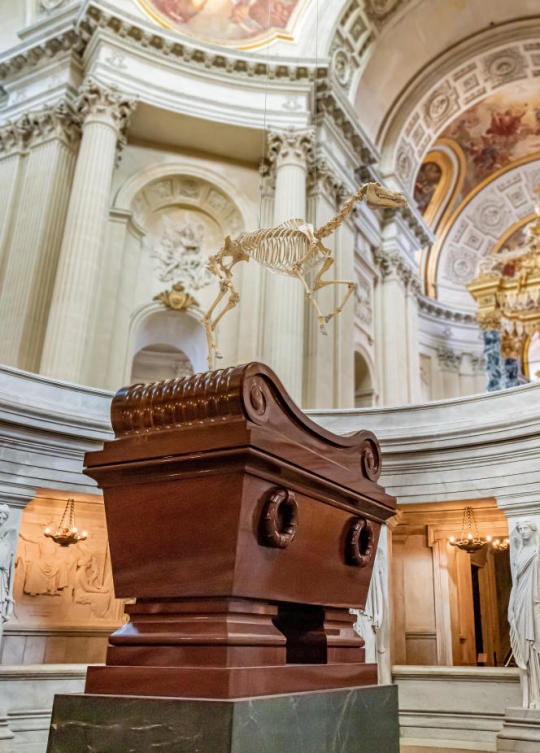
Unpopular opinion, probably, but then, I am a bad bonapartist after all. I kind of like this; the installation is called Memento Marengo and it's a work of French artist Pascal Convert. It has sparkled some controversy among French historians specialists of the Napoleonic period, to be more specific Thierry Lentz - his books are better than his Twitter account - and Pierre Branda. The installation, which is a replica in plastic of the skeleton of Marengo, Napoleon's most famous horse, is part of an exposition in which “thirty contemporary artists [including Julian Schnabel and Marina Abramovic] received carte blanche to question this symbolic and historical figure” (source). The installation will be on place from May the 7th to next January.
I won't bore you telling how there wasn't really a horse named Marengo in the imperial stables, but anyway if you want to read the author's interpretation, which is the one that counts, there you go. A fragment, translated with google because, oh surprise, I have become even lazier and I am so not looking forward to controversies around Naps' commemorations (other than I agree in commemorating the bicentenary while not forgetting all the terrible stuff? Yeah, that's where I stand):
Bringing Napoleon's horse back to the tomb of his rider accomplishes an ancient funeral ritual that wanted the combatants to be buried with their mounts, as is the case with the Gallic tomb of the Gondola riders, at the necropolis of Piovego in Padua or in some archaeological sites in China. In some cases, the horse was not buried with its rider but suspended above its grave, a sort of celestial vehicle to the afterlife. No sacrilegious attack on a national necropolis, the simple fulfillment of a destiny.
But also a questioning. The presence of a skeleton above the tomb summons the transients sculpted on the tombs, of the Saint-Denis basilica for example. Beyond the pomp and glory, death is present (...)
The Memento Marengo sculpture draws the constellation of Napoleon Bonaparte, from his rise to his fall, and recalls the fate of every human being, even when blinded by his glory, he takes himself for a demigod. It is a contemporary memento mori… Remember that you are going to die, the expression was repeated by the slave who accompanied the victorious Roman general during the ceremonies celebrating his victory. Napoleon should have remembered this before reestablishing slavery. The fate of humans brings them together in death.
The vitality of energies in France currently leaves little room for nuance. This is why the work of historians is so important and why they should have no other ambitions than to serve history. Our common history.
8 notes
·
View notes
Text
do u ever hate the sexism that seeps through the pages of napoleonic history
#JOSEPHINE GOT SO MUCH FLACK#EVEN NOW !!! Im looking at u jean tulard#it baffles me how such a renowned historian on the#napoleonic era could make such a sexist comment#n hen theres also more subversive sexism yikes !#honestly pierre brandas book tackles all the important issues and ilov him#◜ ooc . ◞
4 notes
·
View notes
Text
Changes to the Tax Collection System in Revolutionary and Napoleonic France
My translation from Le prix de la gloire: Napoléon et l’argent by Pierre Branda.
This part is specifically about the reforms made to the tax collection system. Problems with taxation had been the source of many woes, so it went through major changes.
“The [tax] work of the Consulate mainly concerned the reorganization of tax collection. Until now, this essential element was not administered directly by the Ministry of Finance. The Constituent Assembly had wanted the tax rolls for direct contributions, that is to say the ‘tax slips’, to be established by municipal administrations. Their work was complex, because each year it was necessary to draw up a list of taxpayers, determine each person’s share of tax and send them the amount of the contribution to pay. Poorly motivated (or even corrupt), the municipalities had put little care in the execution of their mission since a large part of the taxpayers had not yet received anything for their taxes of year VIII, or even of year VII or year VI. Also, with two or three years of delay in preparing the rolls, it was not surprising that tax revenues were low (nearly 400 million francs were thus left outstanding). If the sending of tax matrices left something to be desired, the collection of direct contributions was hardly better. The tax collector was also not an agent of the administration: this function was assigned to any person who agreed to collect taxes with the lowest possible commission (otherwise called ‘collecte à la moins-dite’). With such a system, there were numerous inadequacies, often due to incompetence, but also due to the prevailing spirit of fraud. However, in their defense, the profits of the collectors were most of the time too low to provide such a service; also, to compensate for their losses, they were ‘forced’ to multiply small and big cheats. In any case, in such a troubled period, letting simple individuals carry out such a delicate mission could only be dangerous for the regularity of public accounts. In short, the mode of operation of taxation that Bonaparte and Gaudin inherited was failing on all sides and threatened to sink the State.”
“One month after Gaudin’s appointment, on December 13, 1799, the Directorate of Direct Contributions was created with the mission of establishing and sending tax matrices. This administration, dependent on the Ministry of Finance, was made up of a general director, 99 departmental directors and 840 inspectors and controllers. The organization of direct contributions became both centralized and pyramidal, the opposite of the previous system, decentralized and with a confused hierarchy. The work of preparing the rolls, for so long entrusted to local authorities, passed entirely ‘in the hands of the Minister of Finance’ and in this way the taxpayer found himself in direct contact with the administration. The tax system no longer having any obstacles, the beneficial effects of such a measure did not take long to be felt. With ardor, the agents of this new administration carried out considerable work: three series of rolls, that is to say more than one hundred thousand tax slips, were established in a single year. It must be said that the ministry had not skimped on their pay (6,000 francs per year for a director, 4,000 for an inspector and 1,800 for a controller), which was undoubtedly not unrelated to such success.”
“Tax reform was slower. It was not until 1804 that all tax collectors were civil servants. The consular system gradually replaced the collectors of the departments, then of the main cities and finally of all the municipalities whose tax rolls exceeded 15,000 francs. At the end of the Consulate, the entire tax administration was thus entirely dependent on the central government. Subsequently, the one in charge of indirect contributions (taxes on tobacco, alcohol or salt) created on February 25, 1804 and called the Régie des droits réunis was built on the same pyramidal and centralized model. It was the same later for customs.”
“According to Michel Bruguière, historian of public finances, ‘Napoleon and Gaudin can be considered the builders of the French tax administration. [...] They had also developed and codified the essential principles of our tax law, so profoundly derogatory from the rules of French law, since the taxpayer has nothing to do with it, while the administration has all the powers’. Basically, after having clearly understood the true cause of the ‘financial wound’, Bonaparte wanted an effective, almost ‘despotic’ instrument to avoid experiencing the unfortunate fate of his predecessors. As a good soldier, he created a fiscal ‘army’ responsible for providing the regime with the sinews of war. It was also necessary to definitively break the link between private interests and state service in everything that concerned public revenue. The time of the farmer generals of the Ancien Régime or the ‘second-hand’ collectors of the Directory was well and truly over. Napoleon Bonaparte, with his fierce desire to centralize power in this area as in many others, undoubtedly gave his regime the means to last.”
French:
Page 208
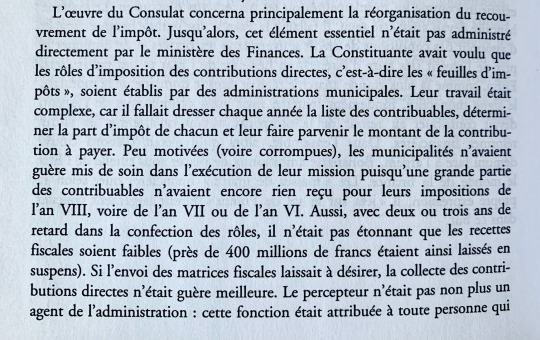
Page 209
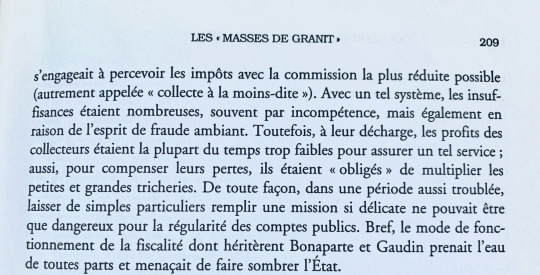
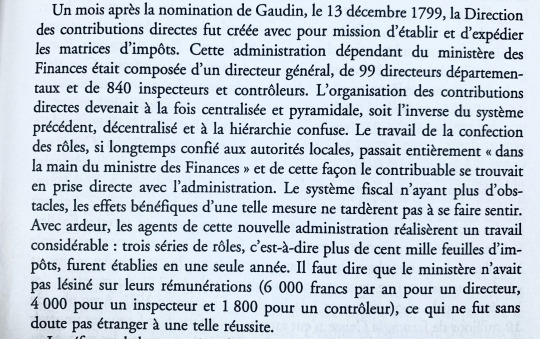
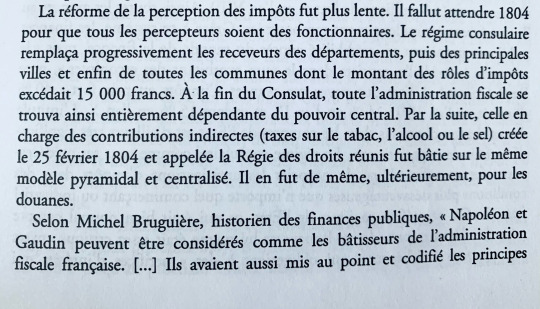
Page 210
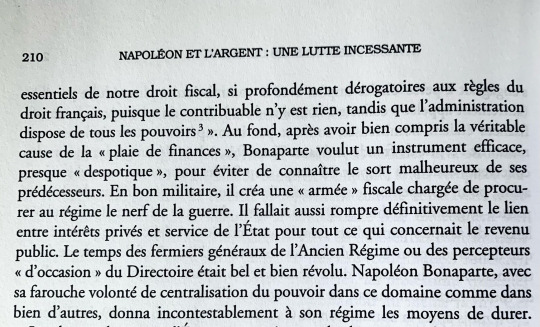
#Le prix de la gloire: Napoléon et l’argent#Le prix de la gloire#Napoléon et l’argent#napoleon#napoleonic era#napoleonic#napoleon bonaparte#19th century#first french empire#1800s#french empire#france#history#reforms#finance#economics#french revolution#frev#la révolution française#révolution française#Gaudin#tax#tax collection system#taxation#law#napoleonic code#source#french history#branda#Pierre branda
36 notes
·
View notes
Photo


Actually, they are my OTP
A gift from Napoleon to Lannes
This is a writing tablet used for campaigns completed with ink. The inscription is: ‘DONNE PAR SA MAJESTE / L’EMPEREUR ET ROI / AU MARECHAL LANNES / DUC DE MONTEBELLO (Given by His Majesty, the Emperor and the King, to Marshal Lannes, Duke of Montebello).’
Pierre Branda believes the writing tablet originally belonged to Napoleon himself. Perhaps Napoleon gave it to Lannes so that the latter would have no excuse for not replying immediately to his Emperor.
For details, please read: https://www.napoleon.org/histoire-des-2-empires/objets/ecritoire-de-campagne-du-marechal-lannes-offert-par-napoleon-ier/
62 notes
·
View notes
Note
Hello Josefa!
I would like to ask you what is it known about the relationship between Hoche and Eugene? What do you think about it? Thank you in advance✨️
Hi, thank you for the question and sorry for taking so long to reply! I really wanted to check Eugène's memoirs, but Gallica does not always want what I want 😊.
So here is what Eugène has to say about his time with Hoche. It's very short, but as I have often mentioned already, Eugène's memoirs are but a very brief fragment, ending after the coronation, and probably only a first draft. This passage follows immediately after Eugène has related how his father was guilotined during the "Terreur", while his mother, after having been imprisoned as well, was set free through the influence of Tallien.
I was too young then to appreciate the full extent of my country's misfortunes; but I felt very keenly the loss I had just suffered. As a result of a government decree which obliged the children of noblemen to learn a trade, I was apprenticed to a carpenter, and my sister Hortense to a seamstress. I left there only to be placed with general Hoche, to whom my father had recommended me a short time before his death. I served for several months as an orderly officer under this general, and started then, while he commanded the army of the Cherbourg coast, and later that of the West, to experience the life of a soldier. The master was severe, and the school, for being hard, was no less good.
So, according to Eugène, it was through his late father how he came to be an orderly for Hoche, not through Hoche's love affair with Josephine. Which of course may just be a lie to cover up Josephine's relationship with this married general. In any case, I have seen Josephine's affair with Hoche being mentioned a lot. The fact that Hoche actually took her son under his wing and got him out of Paris at a time when there was still lots of political turmoil, however, seems to have barely gotten any notice.
But fortunately, there's tumblr and the Nap and Frev community who will answer all your questions. 😀 So here you have an old post of mine (to which I actually have contributed the least), featuring two letters by Eugène to little Hortense, from the time while he was with Hoche at the army in the Vendée, a postscript by Hoche himself and a letter from Hoche to Eugène's grandfather, all indicating that, for what reason ever, the general's relations to the whole family at the time really were rather close.
The only thing I could add is that, according to Josephine's biographer Pierre Branda, there exists one more letter from Hoche to one of his friends, dated May 1795, in which he mentions having some heartache about not receiving any more letters from a young widow, "whose son he had started to regard as his own".
Which, I guess, makes Hoche the first in a long line of surrogate fathers for Eugène. Eugène must throughout his life have had one huge neon coloured writing on his forehead that every older man immediately fell for: Are you my new papa now?
I'm not sure if this truly answers your question, but it's the best I can do as of now. Thank you once more for the Ask! 💖
22 notes
·
View notes
Note
(2/2) I’m very conflicted right now because of this and I hope I haven’t been eagerly learning about a genocidal murderer. I would really appreciate your thoughts on this matter. Thank you very much for your time!
First, let me say I haven’t read this book and I am not expert when it comes to the Haiti campaign. I did look into this book and from what I can gather, the claims the author has put forth has been in contention in the academia world and are disputed.
From Wikipedia:
“Ribbe's most controversial accusation is that the holds of ships were used as makeshift gas chambers; and that up to 100,000 black slaves were murdered in them. These revelations are still in considerable academic dispute, but when the book was published, the French establishment was quick to condemn his allegations. The French newspaper France Soir, for instance, published a stinging editorial, calling the claims of the book insane. The French historian Pierre Branda wrote a critical analysis of Ribbe's book, stating that it is mainly based on suppositions and that the sources are few and often quoted and referred to with heavy omissions.”
What I can address a little more is the Napoleon is Hitler thought. In my personal opinion, no, Napoleon is not and is nothing like Adolf Hitler. That’s in no way saying the man was a saint and that there aren’t horribly terrible things that happened in the Napoleonic Wars. It’s been estimated by David Chandler that up to five million people died in the Napoleonic wars (never clarified if that was people total or just military). If you read the campaigns, you’re going to find a lot not to be tasteful. The Spanish Campaign and what the local populations suffered is terrible. Some of these things you’d find in many different war histories as war shows the very best and the very worst of what humanity can do to each other.
Napoleon was in many ways the first of the modern dictators and because of that, he gets thrown in with a lot of the dictators that would come after him who were much different styles of men and dictators. Hitler was a special brand of dictator who’s power came from the power of dividing people, relying on tribalism and then did the systematic murdering of a select group(s) of people who he deemed to be genetically inferior to the Aryan race. No where are you going to find this in Napoleonic studies. Napoleon never singled out a group of people, Jewish or otherwise, and systematically destroyed them. He did not set up death camps and send people he felt inferior to those places. Napoleon was first and foremost an artillery man, a general, and a fighting general at that. All the things Hitler was not. Napoleon dealt in war, which is horrible enough, but he didn’t deal in genocide.
I personally feel that people who compare Napoleon to Hitler as Napoleon being the carbon copy that Hitler modeled himself after, are people who are lazy and don’t know their Napoleonic or their Third Reich history very well. I am not as well versed in Nazi history as I am in Napoleonic, but I have read enough on Nazi Germany and never have I seen the Reich members say they got the gas chamber idea from Napoleonic warfare or have I seen any historian ever trace the Holocaust back to Napoleonic tactics.
But I can assure you that Napoleon was no Hitler. There is no other Hitler but Hitler.
14 notes
·
View notes
Video
youtube
This video with Pierre Branda is about the cause of Napoleon’s death (no, it’s not due to poisoning).
7 notes
·
View notes